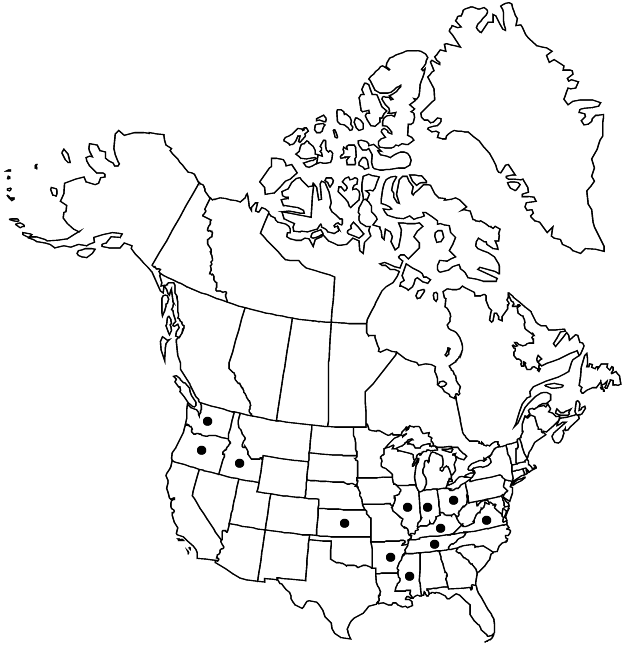Difference between revisions of "Cerastium dubium"
Fl. Maine et Loire ed. 2, 1: 267. 1838.
FNA>Volume Importer |
imported>Volume Importer |
||
| Line 8: | Line 8: | ||
}} | }} | ||
|common_names=Anomalous mouse-ear chickweed | |common_names=Anomalous mouse-ear chickweed | ||
| + | |special_status={{Treatment/ID/Special_status | ||
| + | |code=I | ||
| + | |label=Introduced | ||
| + | }} | ||
|basionyms={{Treatment/ID/Basionym | |basionyms={{Treatment/ID/Basionym | ||
|name=Stellaria dubia | |name=Stellaria dubia | ||
| Line 38: | Line 42: | ||
|elevation=200-800 m | |elevation=200-800 m | ||
|distribution=Ark.;Idaho;Ill.;Ind.;Kans.;Ky.;Miss.;Ohio;Oreg.;Tenn.;Va.;Wash.;s Europe;Asia. | |distribution=Ark.;Idaho;Ill.;Ind.;Kans.;Ky.;Miss.;Ohio;Oreg.;Tenn.;Va.;Wash.;s Europe;Asia. | ||
| + | |introduced=true | ||
|discussion=<p>First collected in North America in 1966 in Washington, <i>Cerastium dubium</i> has now been gathered from many widely scattered sites, and appears to be spreading rapidly.</p> | |discussion=<p>First collected in North America in 1966 in Washington, <i>Cerastium dubium</i> has now been gathered from many widely scattered sites, and appears to be spreading rapidly.</p> | ||
|tables= | |tables= | ||
| Line 64: | Line 69: | ||
|publication title=Fl. Maine et Loire ed. | |publication title=Fl. Maine et Loire ed. | ||
|publication year=1838 | |publication year=1838 | ||
| − | |special status= | + | |special status=Introduced |
| − | |source xml=https:// | + | |source xml=https://bibilujan@bitbucket.org/aafc-mbb/fna-data-curation.git/src/bb6b7e3a7de7d3b7888a1ad48c7fd8f5c722d8d6/coarse_grained_fna_xml/V5/V5_173.xml |
|subfamily=Caryophyllaceae subfam. Alsinoideae | |subfamily=Caryophyllaceae subfam. Alsinoideae | ||
|genus=Cerastium | |genus=Cerastium | ||
Revision as of 00:31, 28 May 2020
Plants annual, taprooted. Stems erect, many-branched from base, 10–40 cm, minutely viscid-glandular; small axillary tufts of leaves usually absent. Leaves not marcescent, distal sessile, proximal spatulate; blade linear or linear- lanceolate to linear-oblong, 10–30 × 1–4 mm, apex obtuse to subacute, glabrous or sparsely and minutely viscid-glandular. Inflorescences lax, 3–21(–30)-flowered cymes; bracts narrowly lanceolate, glandular-pubescent. Pedicels erect, slender, 2–15 mm, 0.5–3 times as long as sepals, glandular-puberulent Flowers: sepals ovate-lanceolate, 5–6 mm, margins narrow, apex acute to obtuse, minutely viscid-glandular; petals oblanceolate, 5–8 mm, 1.5 times as long as sepals, apex 2-fid; stamens 10; styles 3(–4). Capsules oblong-ovoid, straight, 8–11 mm, ca. 2 times as long as sepals; teeth 6, occasionally 8, erect to spreading, margins convolute. Seeds pale brown, ovate, 0.6 mm diam., tuberculate; testa not inflated. 2n = 36, 38.
Phenology: Flowering spring.
Habitat: Alien weed of cultivated land
Elevation: 200-800 m
Distribution

Introduced; Ark., Idaho, Ill., Ind., Kans., Ky., Miss., Ohio, Oreg., Tenn., Va., Wash., s Europe, Asia.
Discussion
First collected in North America in 1966 in Washington, Cerastium dubium has now been gathered from many widely scattered sites, and appears to be spreading rapidly.